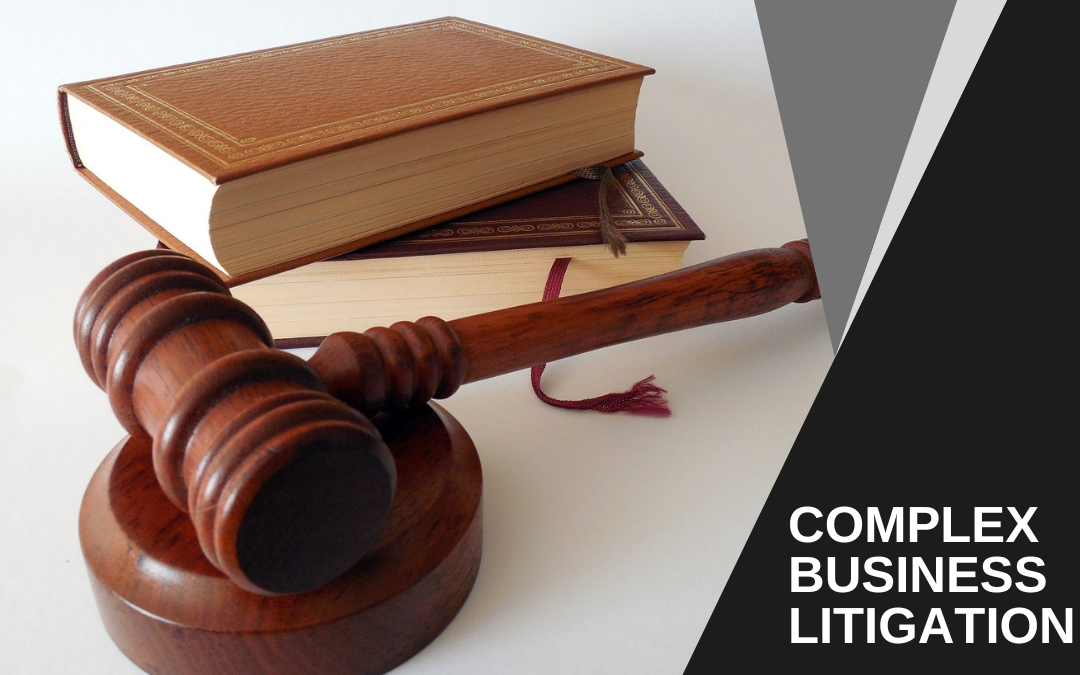
Frequently Asked Questions (FAQs) About Complex Business Litigation
What is Complex Business Litigation?
The complexity of these cases comes from the large volume of evidence, multiple parties, technical legal issues, and the need for specialized expertise in areas like finance, technology, or regulatory compliance. Due to the high stakes and complicated nature of these cases, complex business litigation often requires experienced attorneys and sometimes expert witnesses to navigate.
What Are Common Types of Complex Business Litigation?
Common types of complex business litigation include:
- Contract Disputes: Issues arising from the breach or interpretation of commercial contracts.
- Intellectual Property (IP) Disputes: Conflicts over patents, trademarks, copyrights, and trade secrets.
- Securities Fraud: Allegations of deceptive practices in securities transactions, such as insider trading or misleading financial statements.
- Antitrust Cases: Allegations of anti-competitive practices, like price-fixing or monopolistic behavior.
- Mergers and Acquisitions Disputes: Disagreements related to corporate takeovers, including breach of fiduciary duties.
These cases often involve significant financial stakes, making them complex and high-profile.
How Do I Know If My Business Needs Complex Litigation?
For example, if you’re involved in a multi-million-dollar contract dispute, IP infringement case, or antitrust investigation, it’s advisable to seek legal counsel experienced in complex business litigation. Early legal intervention can help prevent further complications and ensure you have the resources to effectively resolve the matter.
What Should I Do If I Am Facing a Complex Business Lawsuit?
If your business is involved in complex litigation, it’s essential to take several key steps:
- Consult with an experienced business litigation attorney to evaluate the case and help develop a strategy.
- Gather all relevant documents and evidence, such as contracts, financial records, emails, and correspondence, to support your case.
- Consider settlement options or alternative dispute resolution (ADR) methods, such as mediation or arbitration, to avoid the time and expense of a trial.
- Prepare for the long haul, as complex business litigation can take months or even years to resolve.
Acting quickly and strategically can significantly affect the outcome of your case.
How Does Complex Business Litigation Differ from Other Business Disputes?
Additionally, complex business litigation often requires specialized legal and financial expertise. It may involve long discovery periods, motions, expert testimony, and the need for a comprehensive understanding of the industry involved.
What Are the Costs of Complex Business Litigation?
The costs of complex business litigation can be significant due to the time, resources, and expertise required. Key costs include:
- Attorney Fees: Experienced business litigators often charge hourly rates or may offer a flat fee for certain services.
- Expert Witnesses: Experts may be needed to analyze financial data, offer opinions, or explain technical issues.
- Discovery Costs: Collecting, reviewing, and producing documents and electronic evidence can be expensive.
- Court Costs and Filing Fees: These can add up, especially if the case involves multiple jurisdictions.
Given the complexity and scale of these cases, it’s important for businesses to budget carefully and evaluate the potential return on investment in litigation.
What is the Role of Discovery in Complex Business Litigation?
Discovery is a crucial phase in complex business litigation, where both parties exchange relevant documents, evidence, and information. This process can involve the review of extensive financial records, communications, contracts, and other business documents.
Discovery allows attorneys to assess the strength of their case, identify weaknesses, and determine the need for expert witnesses. It also facilitates the preparation of a settlement strategy or trial presentation. In complex cases, discovery can take months or even years, as large volumes of data must be reviewed and analyzed.
What Are the Benefits of Settling Complex Business Litigation?
Settling complex business litigation offers several benefits:
- Cost Savings: Litigation can be expensive, and settlement allows both parties to avoid the high costs of a prolonged trial.
- Certainty: Settlement provides a guaranteed resolution, whereas trials carry unpredictable outcomes.
- Time Efficiency: Settlements typically resolve disputes much faster than litigation, which can drag on for years.
- Confidentiality: Settling can prevent sensitive business information from becoming public.
In many cases, businesses may prefer to settle in order to focus on their operations and avoid the reputational risks associated with a public trial.
How Long Does Complex Business Litigation Typically Take?
Factors that affect the timeline include the complexity of the legal issues, the number of parties involved, the jurisdiction, and the availability of key witnesses. Discovery alone can take months to complete, and motions, appeals, or settlement negotiations can further extend the timeline.
Can Alternative Dispute Resolution (ADR) Be Used in Complex Business Litigation?
Yes, Alternative Dispute Resolution (ADR) methods like mediation and arbitration are often used in complex business litigation to resolve disputes outside the courtroom. ADR can offer several advantages, including:
- Cost-Effectiveness: ADR can be more affordable than going to trial.
- Confidentiality: ADR proceedings are typically private, which can protect sensitive business information.
- Faster Resolution: ADR generally resolves disputes more quickly than court litigation.
- Flexibility: The parties have more control over the process, allowing for creative solutions.
However, ADR may not be suitable for all cases, especially when legal precedent or a formal legal ruling is needed. A skilled business litigator can advise on whether ADR is appropriate for your situation.
These articles are for general informational purposes only and are not legal advice. Contact us today to discuss your specific situation.
